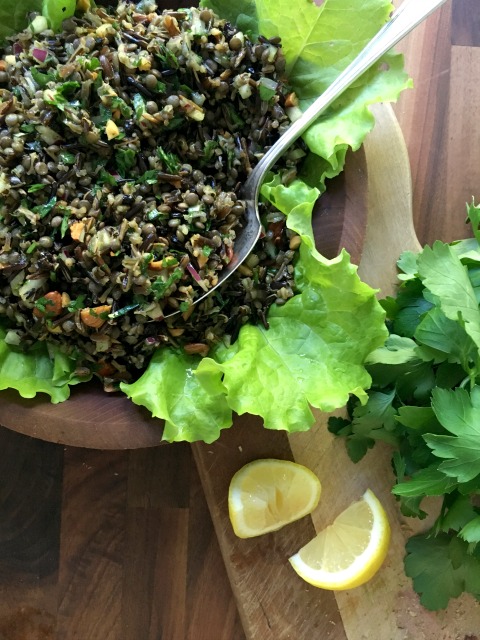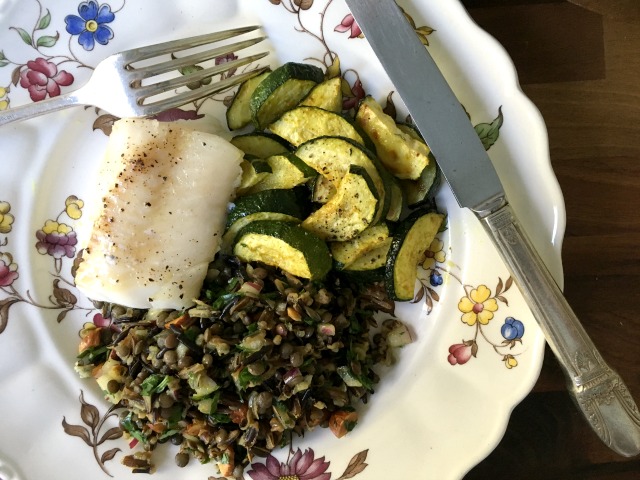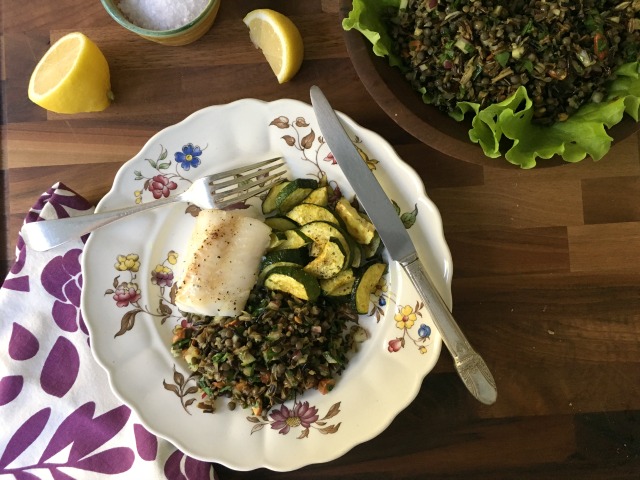Kara’s wild rice lentil salad is a great salad for summer. It’s tossed with a fragrant vinaigrette that’s seasoned with coriander, cumin, turmeric and cinnamon and sprinkled with currants and toasted almonds.
It has become a tradition for us to spend the August long weekend with friends at their cottage on the Northumberland Strait. Since they now live out west we try to cram a years’ worth of visiting into a couple of days. We have a great feast, take long walks and delight in watching our kids pick up where they left off at the previous year’s visit.
This wild rice lentil salad recipe is one my friend Kara served on our visit a few years ago. It was the year she and I got caught in a dramatic lightning storm while on a morning walk.
The air was thick and almost crackled as we raced back to the cottage, counting the space between lightning and thunder and trying frantically to recall our thunder storm safety tips from elementary school. We reached the cottage just as hail stones started to fall. They were the size of crab apples, bouncing off everything and blanketing the deck. Watching the scene on a sticky August morning had us all mesmerized.
The storm left us with a cracked windshield on our car and a summer storm story that my kids love to retell.
Kara’s wild rice lentil salad is a great salad for summer. It’s tossed with a fragrant vinaigrette that’s seasoned with coriander, cumin, turmeric and cinnamon and sprinkled with currants and toasted almonds. Wild rice lentil salad is great with fish and chicken but also works on its own as a meatless meal.
Green tip: Cook your own dried lentils rather than buying canned. The plastic linings on cans contain BPA, a hormone disruptor that seeps into the food. Dried lentils cook quickly and don’t need to be soaked before cooking. Leftover cooked lentils will last a few days in the fridge and can be tossed into any salad.
The recipe as written can also be tossed with two cups of cooked white or brown rice.
Kara’s Wild Rice Lentil Salad
- 1 cup wild rice, rinsed and drained
- 1 cup minced red onion
- 1-1 ½ cups cooked green or brown lentils
- ½ cup parsley, chopped
- ¼ cup currants or dried cranberries
- ½ cup toasted almonds or pumpkin seeds
- Salt to taste
- A squeeze of fresh lemon or lime juice
Coriander Vinaigrette:
- ¼ cup vinegar (white wine vinegar or cider vinegar)
- ¼ cup good olive oil
- ½ Tbsp. honey or maple syrup
- 1 tsp. coriander
- 1 tsp. cumin
- ½ tsp. turmeric
- ¼ tsp. cinnamon
- Combine wild rice in a pot with 4 cups of water. Bring to a boil, reduce heat and cover. Cook until tender then drain.
- Combine dressing ingredients in a bowl, whisk until combined.
- Add currants to dressing and let rest while you prepare the remaining salad ingredients.
- Toss cooked rice with lentils and dressing.
- Fold in onion and parsley and sprinkle with almonds. Season with salt and squeeze lemon or lime juice over top just before serving.








